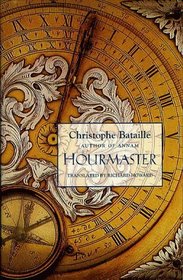I wanted to think about this one for a few days after reading it before writing anything about it. I couldn't really decide what I thought of it.
Unfortunately, I think I've decided that I was really unimpressed by it.
Why? The writing is lyrical and beautiful, with a mythological, fairy-tale cadence to it. The author won a prize for his debut novel, Annam (which I have not read). It kind of seems like there ought to be something significant to take away from this brief novel - like it ought to be symbolic - or at least have something to say.
But it doesn't.
Other reviewers have described it as a "fable without a moral."
But not only does it not have a "moral," it doesn't have a proper plot structure, and it doesn't give any feeling of satisfaction.
In 17th century Europe, the duke Gonzaga employs an hourmaster to wind and repair his castle's many clocks. The first hourmaster mysteriously disappears - foul play? Another is hired. He leaves after getting beat up one night. Is someone out to assure that Gonzaga has no hourmaster? We never find out. A third man is hired for the job, Arturo, and most of the book deals with this character, and his relationship to the duke. There seems to be no point at all to the early incidents in the book.
The book ends with a tragic crime being committed - but since it happens to a character who was just introduced a few pages before, the emotional impact is very limited. I suppose we are supposed to see it as a betrayal of friendship, rather than as the crime against the individual - but I don't think it really works.
There's also a narrator who is none of the characters in the story - there are some few insights into his personality, but why? Who he is doesn't reflect on the events or themes of the book at all. (Which main theme seems to be: 'the rich and powerful are selfish and untrustworthy.' Not too earthshaking a proclamation.)
Overall, this story reminded me of something one might find in a somewhat pretentious college literary magazine which was attempting (poorly) to emulate the 19th century salons of Paris.
Unfortunately, I think I've decided that I was really unimpressed by it.
Why? The writing is lyrical and beautiful, with a mythological, fairy-tale cadence to it. The author won a prize for his debut novel, Annam (which I have not read). It kind of seems like there ought to be something significant to take away from this brief novel - like it ought to be symbolic - or at least have something to say.
But it doesn't.
Other reviewers have described it as a "fable without a moral."
But not only does it not have a "moral," it doesn't have a proper plot structure, and it doesn't give any feeling of satisfaction.
In 17th century Europe, the duke Gonzaga employs an hourmaster to wind and repair his castle's many clocks. The first hourmaster mysteriously disappears - foul play? Another is hired. He leaves after getting beat up one night. Is someone out to assure that Gonzaga has no hourmaster? We never find out. A third man is hired for the job, Arturo, and most of the book deals with this character, and his relationship to the duke. There seems to be no point at all to the early incidents in the book.
The book ends with a tragic crime being committed - but since it happens to a character who was just introduced a few pages before, the emotional impact is very limited. I suppose we are supposed to see it as a betrayal of friendship, rather than as the crime against the individual - but I don't think it really works.
There's also a narrator who is none of the characters in the story - there are some few insights into his personality, but why? Who he is doesn't reflect on the events or themes of the book at all. (Which main theme seems to be: 'the rich and powerful are selfish and untrustworthy.' Not too earthshaking a proclamation.)
Overall, this story reminded me of something one might find in a somewhat pretentious college literary magazine which was attempting (poorly) to emulate the 19th century salons of Paris.




